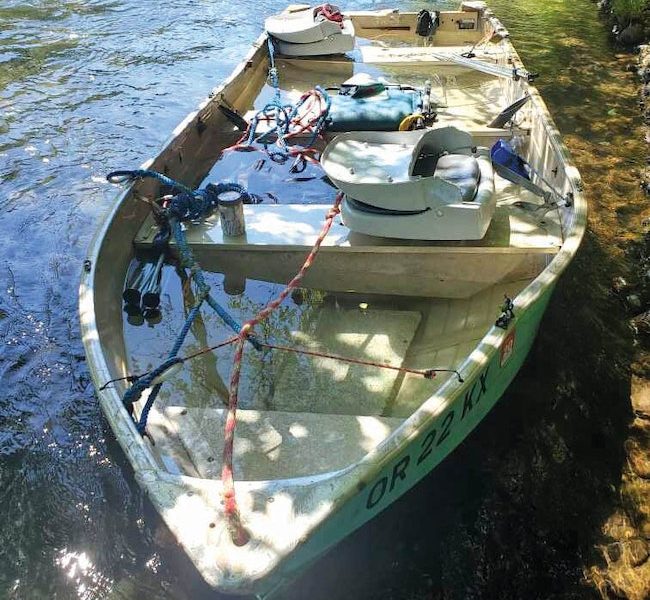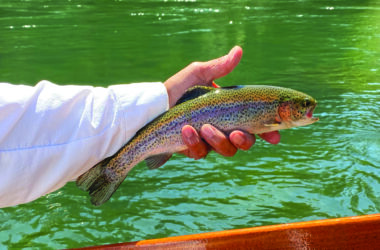 This boat would have been fine on a pond or small lake but is terribly designed for even mild whitewater and river currents. All photos provided by Mark Swick
This boat would have been fine on a pond or small lake but is terribly designed for even mild whitewater and river currents. All photos provided by Mark Swick
It’s just one of those facts of nature and an unfortunate reality that some only come to realize when it’s a little too late. That we often recreate, boat and fish in places that can be downright dangerous for people who are not prepared. For anyone naïve to the challenges, danger is as close as a single misplaced footstep, a gust of wind, a submerged stick or a moment of indecision.
Just this season, a number of Oregonians already have found themselves in a treacherous situation and in about a half-dozen cases the mishap ended in a fatality. Which no doubt was a tragedy and loss that deeply affected family members and friends too. I have also lost friends to the river and sadly in every case there was a general lack of individual preparedness and no chance of a “do over.”
 The owner of this boat had run the same rapid on the McKenzie for three consecutive days. On the third day, everything went sideways. The boat flipped, dumping three people and all their gear into the river, fortunately everyone was wearing a life jacket. The current then pushed the boat down stream along the river bottom for a quarter mile. The boat was recovered minus front seats, dry box and casting deck by river technician Mark Swick.
The owner of this boat had run the same rapid on the McKenzie for three consecutive days. On the third day, everything went sideways. The boat flipped, dumping three people and all their gear into the river, fortunately everyone was wearing a life jacket. The current then pushed the boat down stream along the river bottom for a quarter mile. The boat was recovered minus front seats, dry box and casting deck by river technician Mark Swick.
Now I’ve been a river boater for over 45 years, rivers are beautiful forces of nature that have always called to me. I have stood over a rapids-filled wilderness river and calculated the risk of running that river dozens of times. I have chosen to walk my boat along the edge of a huge rapid a few times. I have also walked away from a few rivers after determining the risk was too big for me.
My mental checklist goes like this, I ask myself these questions: “Am I skilled and experienced enough to run this river?” “Is my boat capable and suited to do what I’m considering?” “If it goes wrong, what are the consequences?” and finally “Am I prepared to deal with the consequences of failing?” Let’s unpack. …
For river boaters, “skill” can be a subjective quality and one that can easily be overestimated because of a couple of successful days on a single river, under ideal conditions that go off without a hitch. “Skill” can be taught and locally there are a number of organizations and businesses that either teach rudimentary boating skills or offer “social instruction” through their sponsorship of group events for novices. Luckily, river skills are not difficult to learn, it’s basic hand-and-eye coordination and if you can drive a car you can no doubt learn to be a “river boater.”
But skill should never be confused with experience. Experience only comes from utilizing learned skills over years and in a variety of river and weather conditions. But learning is worth the effort and years of experience will eventually dictate your entire river life. From the apparel you wear to the gear you carry on every float. It’s time and effort but experience allows you to broaden the number of rivers you can confidently explore. Because don’t forget “there are so many rivers on the Earth and we have so little time here.”
Given skill and some experience let’s consider your boat. Is it appropriate for the river? Well, rivers are as dynamic as any force of nature you can imagine. An EMS instructor at Lane Community College my friend Mark Swick sums it up this way: “(Moving) water is relentless, it doesn’t stop, there is no timeout. Moving water should always be viewed with respect and caution.” Swick is also a certified swift-water rescue and technical ropes rescue technician who river guides in the summer and does river salvage on the McKenzie River.
“Most of the people who contacted me for salvage work were either in a boat that wasn’t made for the river or just didn’t have enough experience,” he said. “I think that the biggest hazards for boaters are unseen hazards mixed with cold water. The rivers are always changing and at any moment can get a new hazard. They can be fallen trees, root wads or even a submerged shopping cart. People don’t always see these hazards or don’t pay attention to them until it’s too late.”
Let me say that with some training, drift boats, rafts, inflatable pontoon boats, kayaks and even some canoes are suitable for many rivers. I will add that the “thin-skin pool toy” is the No. 1 mechanism for drownings in Oregon.
 Extracting a boat from the river can be a dangerous task, one that should only be attempted by a professional “swift water technician.” Hundreds of feet of static rope, high tensile strength pulleys, carabiners and some other hardware are part of Mark Swick’s rescue kit.
Extracting a boat from the river can be a dangerous task, one that should only be attempted by a professional “swift water technician.” Hundreds of feet of static rope, high tensile strength pulleys, carabiners and some other hardware are part of Mark Swick’s rescue kit.
There is no substitute for assessing river hazards and the consequences other than experience. But an overturned drift boat or raft in the middle of summer has very few of the consequences it would have in winter or spring. Missing an oar stroke or not catching an eddy in summer might be somewhat embarrassing especially if you swim. But as long as you are wearing a life jacket the chances of it becoming tragic are pretty low. Not so for winter or spring when higher flows and lower water temperatures could be dire for anyone with the wrong apparel, gear or wearing a life jacket that is not rated for “whitewater.”
“Surviving the consequences of failing” … There are two types of river boaters, “those who have swam and those who are going to.” I alluded to it already but a swim in the river can either be an experience of controlled chaos where the intricacies of the event are responded to with the confidence of experience. Ultimately a great inconvenience but no real big deal. Or it can be an absolute and out-of-control tragedy where no one had the skills, experience or wherewithal to respond on a day that everyone directly and indirectly involved could regret dearly.
A final word: No one, even with years of experience, should ever think they “have seen it all.” Because when it comes to rivers every day is different.
 The owner of this boat should have never attempted to run a section of the McKenzie River in this style of “lake boat.” They only made it 75 yards down river when the current sucked the boat to the river bottom when they attempted to anchor in a spot to fish. They lost all their gear but life jackets saved everyone on board.
The owner of this boat should have never attempted to run a section of the McKenzie River in this style of “lake boat.” They only made it 75 yards down river when the current sucked the boat to the river bottom when they attempted to anchor in a spot to fish. They lost all their gear but life jackets saved everyone on board.
You can contact Frank through his website rivertrailoutfitters.com.








